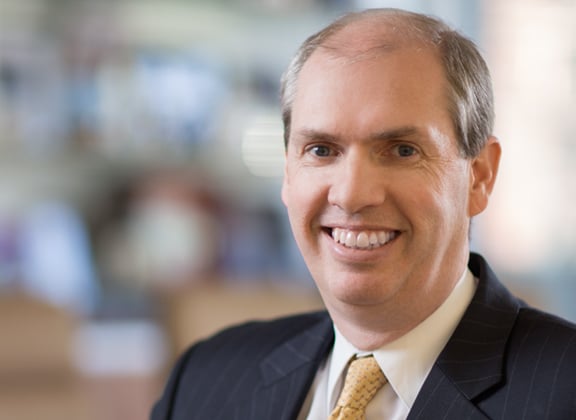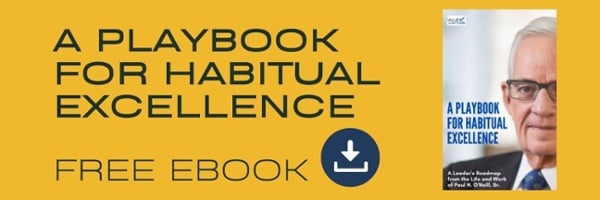Originally published September 2019, updated to include the full text of the post by Geoff Webster.
I wrote a post titled A Study in Principles That Drive Habitual Excellence, originally published by the Shingo Institute, in which I shared personal insights to the recent Johnson Institute for Responsible Leadership study of the leadership values of Paul O'Neill. I provided examples that demonstrate O'Neill's principles in action.
For example, there is the principle, "Respect Every Individual":
"You may know that Paul used zero worker safety incidents as an anchor of Alcoa’s transformation. You may not know that Paul specifically selected safety because it is a fundamental pre-condition for respect. 'Almost every organization has in its annual report the words ‘people are our most valuable asset,’ but looking at their safety data they have no evidence that it is true.' By selecting the elimination of worker safety incidents as a pre-condition, and not as a priority to be traded against other values, Paul lived respect every day."
The Entire Post:
A few years ago, our mentor, Paul O’Neill, was honored by the Johnson Center for Responsible Leadership at the University of Pittsburgh’s Graduate School of Public and International Affairs, and invited to share learning with the students and faculty there. I share with you their publication of his teaching for its timeless leadership messages. It is a valuable read for any leader pursuing habitual excellence in their organization.
In documenting the learning, the Johnson Institute interviewed myself and other colleagues. The stories that we shared added nuance to Paul’s leadership framework. However, in describing the transformational results Paul enabled at OMB, Alcoa, RAND, and the US Treasury, the Shingo principles provided grounding that helped emphasize the universality of the framework that Mr. O’Neill teaches.
“Based on timeless principles, we shape cultures that drive operational excellence.”
No leader better embodies this stated purpose of the Shingo Institute than Paul. During Paul’s tenure as CEO (1987 – 2000) and in the decade after, driven by Paul’s belief that zero safety incidents was the driving values-based goal for an ethical company, Alcoa’s lost workday incidents dropped from 1.86 to 0.09 per 100 employees.
Driven to always find a better way (Embrace Scientific Thinking), to create better conditions for employees (Respect Every Individual, Focus on Process, Seek Perfection, Think Systemically, Create Constancy of Purpose), and to improve outcomes (Create Value for the Customer), Paul humbly led Alcoa to a sustainable state of organizational excellence that improved for more than a decade after his departure.
To illustrate why principles are so central to his leadership, I have chosen just one O’Neill vignette to illustrate each Shingo principle and its alignment with Mr. O’Neill’s leadership framework.
Respect Every Individual:
You may know that Paul picked a vision of zero worker safety incidents as an anchor of Alcoa’s transformation. You may not know that Paul picked safety because it is a fundamental pre-condition for respect.
“Almost every organization has in its annual report the words ‘people are our most valuable asset,’ but looking at their safety data they have no evidence that it is true.”
By picking the elimination of worker safety incidents as a pre-condition - not a priority to be traded against other values - Paul lived respect every day.
Lead with Humility:
When asked by people how they are going to get to zero workplace injuries, his response is “I don’t know, but we are going to learn how together.” Paul modeled humility by going into every situation with a deep understanding that what you don’t know far exceeds what you do. He teaches perpetual curiosity to ask simple, childlike questions to develop learning as an organizational competency. In short, Mr. O’Neill taught organizations to be learning organizations starting with personal humility.
Seek Perfection:
Mr. O’Neill continually challenges our thinking towards the “theoretical limit.”
“If God doesn’t prevent us doing something, then we can do it.”
Contrary to the common thinking that aiming for perfect is discouraging to people, we have used theoretical limit thinking to drive a national push for zero harm in healthcare, and achieved what was thought to be impossible - the elimination of whole classes of harm across health systems.
Embrace Scientific Thinking:
A common mantra from Mr. O’Neill was “show me the facts.” Paul continually challenged everyone around him to challenge their own logic and assumptions to create a continual series of rigorous experiments to learn our way to the truth.
Focus on Process:
Mr. O’Neill did not allow us to accept the idea that people are at the root of problems, always digging for the process failure that causes imperfect outcomes.
“When you accept a person as a root cause, you enable blame and deprive yourself of learning.”
In health systems where this has taken hold, leaders investigate the system causes of each event, leading to 50%+ reductions in incidents per year.
Assure Quality at the Source:
Paul told the story of the early days at Alcoa when a plant leader was working to optimize the work of a person using sawdust and a broom to reduce the risk of people slipping on oil slicks on the plant floor.
The simple question “why is there oil on the floor?” helped people learn that forklifts routinely leaked. By aiming for perfect quality from all suppliers, Alcoa helped drive global improvements in forklift technology, simply by not accepting defects to begin with.
Flow & Pull Value:
Mr. O’Neill was always looking for new learning that can produce value. Learning from his peers at Toyota, the flow and pull principles became deeply embedded at Alcoa, ensuring that all work was pulled by the customer.
In healthcare, our clients have redesigned whole medication and supply pathways, leading to 50-98% reductions in harm while reducing the costs by more than 20%.
Think Systemically:
Early in Mr. O’Neill’s tenure at Alcoa there were times when all of the businesses were making money on paper, but the overall financial health of the company was poor. Paul understood (and taught the team) that it is necessary to align value streams in ways that optimize the whole rather than the parts.
Create Constancy of Purpose:
The words “True North” are used frequently in “Lean Transformations” today. Many of these examples don’t meet the test of constancy of purpose. Paul simplified it.
When he picked worker safety he selected something that would “never change, regardless of market conditions or changing business circumstances.” Paul taught us that “unarguable, values-based goals” like zero harm in health care are the universal route to constancy of purpose.
Create Value for the Customer:
At Alcoa, 100% production of on-time, Grade A aluminum created by workers who were safe and valued was always the value equation. This led him to teach everyone, every day to question everything that interfered with that goal.
In healthcare, a prime example of unintended value destruction is the requirement for patients to sign HIPAA forms that do nothing to actually protect privacy while costing millions per year to administer.
Paul was Value Capture’s Non-executive Chairman, and was a driving, guiding, and inspirational force for us since our origins in 1998. It was truly an honor to work with him, learn from him and share a vital mission with him. We hope this publication from the Johnson Center, and these informal lessons from our work together, will add value to people’s understanding of the principles and to your journey toward habitual excellence.

Written by Geoff Webster
Mr. Webster is a co-founding principal of Value Capture. He leads Value Capture's advisory business. Full Bio



Submit a comment